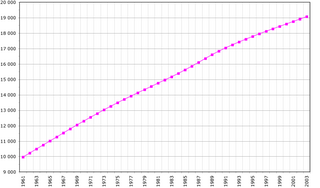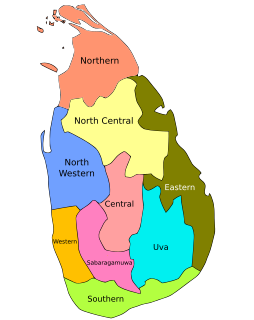
The Liberation Tigers of Tamil Eelam was a Tamil militant organization that was based in northeastern Sri Lanka. Founded in May 1976 by Velupillai Prabhakaran, it waged a secessionist nationalist insurgency to create an independent state of Tamil Eelam in the north and east of Sri Lanka for Tamil people. This campaign led to the Sri Lankan Civil War, which ran from 1983 until 2009, when the LTTE was eventually defeated during the presidency of Mahinda Rajapaksa.

This article is about the demographic features of the population of Sri Lanka, including population density, ethnicity, education level, health of the populace, economic status, religious affiliations and other aspects of the population.

Colombo is the commercial capital and largest city of Sri Lanka by population. According to the Brookings Institution, Colombo metropolitan area has a population of 5.6 million, and 752,993 in the city proper. It is the financial centre of the island and a popular tourist destination. It is located on the west coast of the island and adjacent to the Greater Colombo area which includes Sri Jayawardenepura Kotte, the legislative capital of Sri Lanka and Dehiwala-Mount Lavinia. Colombo is often referred to as the capital since Sri Jayawardenepura Kotte is within the urban area of, and a suburb of, Colombo. It is also the administrative capital of the Western Province and the district capital of Colombo District. Colombo is a busy and vibrant place with a mixture of modern life and colonial buildings and ruins. It was the legislative capital of Sri Lanka until 1982.

The Government of Sri Lanka (GoSL) is a semi-presidential system determined by the Sri Lankan Constitution. It administers the island from both its commercial capital of Colombo and the administrative capital of Sri Jayawardenepura Kotte.

The 1996 Cricket World Cup, also called the Wills World Cup 1996 after its official sponsors, ITC's Wills brand, was the sixth Cricket World Cup, organised by the International Cricket Council (ICC). It was the second World Cup to be hosted by Pakistan and India, and for the first time by Sri Lanka. The tournament was won by Sri Lanka, who defeated Australia in the final at the Gaddafi Stadium in Lahore, Punjab.

The Sri Lankan Civil War was an armed conflict fought on the island of Sri Lanka. Beginning on 23 July 1983, there was an intermittent insurgency against the government by the Liberation Tigers of Tamil Eelam, which fought to create an independent Tamil state called Tamil Eelam in the north and the east of the island. After a 26-year military campaign, the Sri Lankan military defeated the Tamil Tigers in May 2009, bringing the civil war to an end.

The Sri Lanka national cricket team, nicknamed The Lions, represents Sri Lanka in international cricket. It is a full member of the International Cricket Council (ICC) with Test, One-Day International (ODI) and T20 International (T20I) status. The team first played international cricket in 1926–27, and were later awarded Test status in 1982, which made Sri Lanka the eighth Test cricket playing nation. The team is administered by Sri Lanka Cricket.
SriLankan Airlines is the flag carrier of Sri Lanka and a member of the Oneworld airline alliance. It is currently the largest airline in Sri Lanka by number of aircraft and destinations, and was launched in 1979 as Air Lanka following the termination of operations of the original Sri Lankan flag carrier Air Ceylon. Following its partial acquisition in 1998 by Emirates, it was re-branded and introduced the current livery. In 2008 the government of Sri Lanka acquired all the shares of the airline from Emirates.After ending the Emirates partnership, it has continued using its re-branded name and logo. The airline did not change the branding after government acquired majority stakes from Emirates in 2008.

In Sri Lanka, provinces are the first level administrative division. They were first established by the British rulers of Ceylon in 1833. Over the next century most of the administrative functions were transferred to the districts, the second level administrative division. By the middle of the 20th century the provinces had become merely ceremonial. This changed in 1987 when, following several decades of increasing demand for a decentralization, the 13th Amendment to the 1978 Constitution of Sri Lanka established provincial councils. Currently there are nine provinces.

Theravada Buddhism is the State religion of Sri Lanka practiced by 70.2% of the Sri Lanka's population. Buddhism has been given special privileges in the constitution and also declared country's official religion by 2nd president of sri Lanka J.R Jayawardene. Sri Lanka is traditionally oldest religious Buddhist country where Buddhist aryan culture is protected and preserved. The island has been a center of Buddhist scholarship and learning since the introduction of Buddhism in the third century BCE producing eminent scholars such as Buddhaghosa and preserving the vast Pāli Canon. Throughout most of its history, Sri Lankan kings have played a major role in the maintenance and revival of the Buddhist institutions of the island. During the 19th century, a modern Buddhist revival took place on the island which promoted Buddhist education and learning. There are around 6,000 Buddhist monasteries on Sri Lanka with approximately 15,000 monks.
The Sri Lanka national football team represents Sri Lanka in association football and is controlled by the Football Federation of Sri Lanka, the governing body for football in Sri Lanka. Sri Lanka's home grounds are Sugathadasa Stadium and Kalutara Stadium. The Sri Lankan team was known as the Ceylon national football team until 1972 when Ceylon was renamed Sri Lanka.

Islam is a minority religion in Sri Lanka. 9.7% of the Sri Lankan population practice Islam. 1,967,227 persons adhere to Islam as per the census of 2012.

UTC+05:30 is an identifier for a time offset from UTC of +05:30. This time is used in India and Sri Lanka. It is five and a half hours ahead of Coordinated Universal Time.

Sri Lankan Tamils or Ceylon Tamils, also known as Eelam Tamils in Tamil, are members of the Tamil ethnic group native to the South Asian island state of Sri Lanka. According to anthropological and archaeological evidence, Sri Lankan Tamils have a very long history in Sri Lanka and have lived on the island since at least around the 2nd century BCE. Most modern Sri Lankan Tamils claim descent from residents of Jaffna Kingdom, a former kingdom in the north of the island and Vannimai chieftaincies from the east. They constitute a majority in the Northern Province, live in significant numbers in the Eastern Province and are in the minority throughout the rest of the country. 70% of Sri Lankan Tamils in Sri Lanka live in the Northern and Eastern provinces.
Sri Lankan Americans ; are Americans of full or partial Sri Lankan ancestry. Sri Lankan Americans are persons of Sri Lankan origin from various Sri Lankan ethnic backgrounds. The people are classified as South Asian in origin.

Several languages are spoken in Sri Lanka within the Indo-European, Dravidian and Austronesian families. Sri Lanka accords official status to Sinhala and Tamil. The languages spoken on the island nation are deeply influenced by the languages of neighbouring India, the Maldives and Malaysia. Arab settlers and the colonial powers of Portugal, the Netherlands and Britain have also influenced the development of modern languages in Sri Lanka.

Films produced in Sri Lanka ordered by the date of release

The Central Province is one of the nine provinces of Sri Lanka, the first level administrative division of the country. The Central Province is primarily in the central mountainous terrain of Sri Lanka. It is the 6th largest province by area and is home to 2.5 million people. It is bordered by North Central Province to the north, Uva Province to the east, North Western Province to the west and Sabaragamuwa Province to the south and west. The province's capital is Kandy.

Pallewatte Gamaralalage Maithripala Yapa Sirisena is a Sri Lankan politician, the seventh and current President of Sri Lanka, in office since January 2015. Sirisena is Sri Lanka's first president from the North Central Province of the country and does not belong to the traditional Sri Lankan political elite.
















